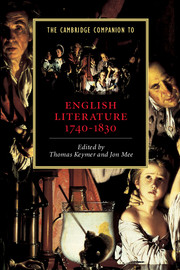Book contents
- Frontmatter
- Part I Contexts and modes
- Part II Writers, circles, traditions
- 8 Richardson, Henry Fielding, and Sarah Fielding
- 9 Johnson, Boswell, and their circle
- 10 Sterne and Romantic autobiography
- 11 Blake and the poetics of enthusiasm
- 12 ‘Unsex’d females’
- 13 The Lake School
- 14 Jane Austen and the invention of the serious modern novel
- 15 Keats, Shelley, Byron, and the Hunt circle
- 16 John Clare and the traditions of labouring-class verse
- Index
- Series list
9 - Johnson, Boswell, and their circle
from Part II - Writers, circles, traditions
Published online by Cambridge University Press: 28 May 2006
- Frontmatter
- Part I Contexts and modes
- Part II Writers, circles, traditions
- 8 Richardson, Henry Fielding, and Sarah Fielding
- 9 Johnson, Boswell, and their circle
- 10 Sterne and Romantic autobiography
- 11 Blake and the poetics of enthusiasm
- 12 ‘Unsex’d females’
- 13 The Lake School
- 14 Jane Austen and the invention of the serious modern novel
- 15 Keats, Shelley, Byron, and the Hunt circle
- 16 John Clare and the traditions of labouring-class verse
- Index
- Series list
Summary
Samuel Johnson's status as an author is very much bound up with his circle. If it is true that sociability and the study of man as a social animal were key features of the Scottish Enlightenment, it is equally the case that Johnson's reputation depends in significant part on his close friendships with a group almost as famous as himself, and on his depiction as a sociable being in the memoirs of his friends, notably in James Boswell's Life of Johnson (1791). In the seven years after Johnson's death, eleven biographies were published. The struggle over his reputation among his own circle began at once, and the importance of the possession of Johnson's memory seemed at times almost as much part of his value as anything he wrote and spoke in life.
In recent years, some Johnson scholars have questioned whether Boswell’s account is to be trusted, or whether his picture of Johnson as the ‘Hercules of toryism’ is not angled by the perspective of Boswell’s own views. This revisionism no doubt bears a symbiotic relationship to the revaluation of Boswell since 1940: a re-evaluation that has begun to recognize him as an artist rather than an amanuensis, the shaper of a great Life rather than a man who – as Macaulay saw him in the Victorian period – wrote a great book by accident. It is worth noting in respect of Johnson’s politics at least – at present a matter of some controversy in the context of the Life – that Hannah More, Sir John Hawkins, and Mrs Thrale all substantively agree with Boswell regarding his sympathies.
- Type
- Chapter
- Information
- The Cambridge Companion to English Literature, 1740–1830 , pp. 157 - 172Publisher: Cambridge University PressPrint publication year: 2004



